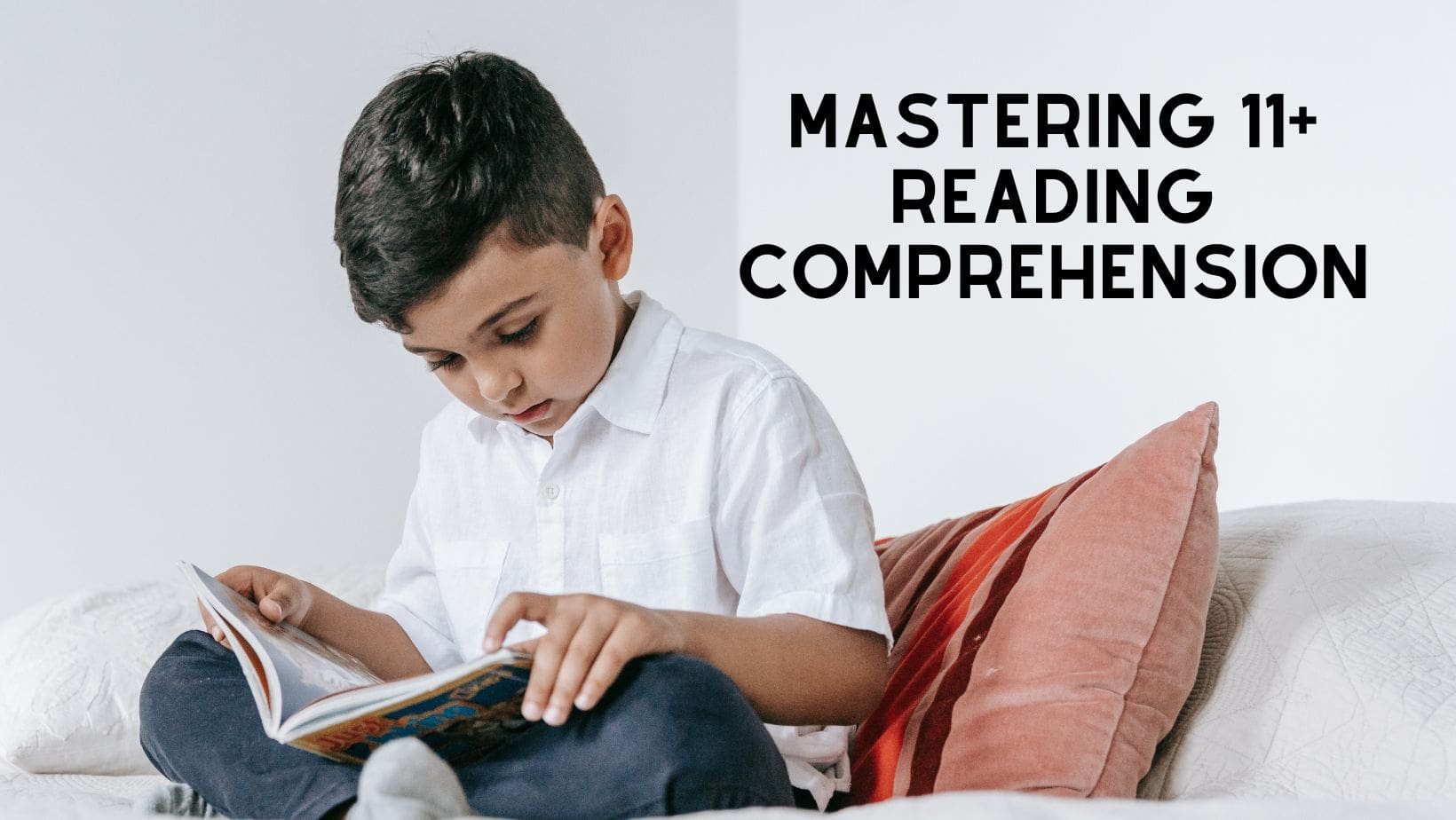Mastering 11+ Reading Comprehension: Top Tips and Resources for Success
What is 11+ Reading Comprehension?
Reading comprehension is a key part of the 11+ English exam format, normally appearing alongside a creative writing (see our separate guide here!) question. In 11+ reading comprehension, students are challenged to respond to questions that test their understanding of a previously unseen text. This guide will unpack the different 11+ reading comprehension question types, explore common mistakes students make in the 11+ reading comprehension exam and how to avoid them, plus some additional preparation strategies and practice questions!
It’s important to note that there is not one single, standard 11+ exam or exam format. Different schools will require students to sit slightly varying papers. Some students use the standardised Common Entrance (CE) 11+, or share a standard with other schools in the area (e.g. the London Consortium), others set their own papers. Make sure you research the specific requirements and format of the school(s) your child is applying to, and take a look at our other 11+ guides which talk you through the entrance requirements of top UK independent schools such as Godolphin and Latymer or St Paul’s. This guide is a great overview to understanding the 11+ Reading Comprehension component and offers useful and universal tips to help with all 11+ reading comprehension questions. If you’d like more school-specific guidance, get in touch to arrange a free initial consultation to discuss how we can support you on your 11+ journey.
11+ Reading Comprehension Question Types
In the 11+ reading comprehension, students are presented with an unseen text that could be an extract from either fiction or non-fiction. Below the text, they will find a set of questions testing what they are able to understand and infer from the text.
The 11+ reading comprehension comes in two forms:
Multiple choice: These questions offer students a set of possible answers to choose from. While this might seem easier than having open questions, these questions are designed to be tricksy and catch students out with similar options, so students need to read very carefully to ensure they’ve understood each answer.
Standard format answer questions: These questions require detailed written responses, often needing students to answer in full sentences and without prompts to help them.
You should look for updated information on the website of your school of choice to find out what format your child will sit, and whether the exam is taken online or written.
Within each of these forms, there are a series of common question types that students will likely encounter in any 11+ reading comprehension.
Below we will go through each of them with an example 11+ comprehension with answers!
Inference questions
These questions encourage students to read between the lines of the text. They should think like detectives, really paying close attention to the text and looking for clues in the text that help them answer the question. You can recognise these questions from words like “suggests”, “implies”, or “infer”.
e.g. What can you infer about Ella's feelings as she enters the library? Provide evidence from the text to support your answer.
We can infer that Ella is scared because her “heart is racing”.
Cloze reading
These questions are typically fill-in-the-blank style multiple-choice questions. Students have to use the context of the sentence to work out the right word to put in the gap. This is where vocabulary building exercises are important preparation as students need to be confident knowing synonyms of words and knowing the meaning of all the words in the multiple choice list.
e.g. As Ella stepped inside the library, she felt a sense of ______ wash over her.
A) unease
B) excitement
C) comfort
D) indifferenceInformation Retrieval
Students should put their detective hats on again here as they will need to scan the text in search of clues to the question. It’s important students practise scanning the text and getting used to identifying key details and information that is relevant to the question. The mark scheme is useful here as generally marks will correlate to the number of details students need to include!
e.g. What did Ella notice in the corner of the library?
By scanning the text, the student will find the answer in the final sentence: “Ella noticed a dusty tome.”
Summary Questions
Summary questions in the 11+ reading comprehension are designed to test how students are able to condense information and capture the main points of a passage. To answer these, students need to first identify the key points and then condense them into a sentence.
e.g. In your own words, summarise this paragraph in one sentence.
Despite her fear, Ella enters an old, spooky library and is intrigued by a dusty book.
Comparison Questions
These questions are a bit less frequent in 11+ reading comprehensions but still good to be prepared for! Students need to be able to identify and write about differences and similarities in the text, perhaps between characters or events.
e.g. Compare Ella's feelings when she first sees the library to how she feels after she steps inside.
When Ella first sees the library she feels scared but when she goes in she becomes curious.
Boost Your Child’s 11 + Reading Comprehension Performance with an 11+ Tutor
We have a fantastic team of 11+ English tutors, many of whom have extensive experience helping students gain entry to top UK schools. With our expert guidance, your child will receive targeted instruction to strengthen their reading comprehension skills, expand their vocabulary, and master exam techniques. Our tutors are well-versed in the specific requirements of the 11+ exams, ensuring your child is fully prepared to tackle all aspects of the 11+ admissions journey with confidence.
Investing in a skilled 11+ tutor can significantly boost your child's performance and overall success. Our tutors create a nurturing and supportive learning environment, empowering your child to develop critical comprehension skills and excel in their 11+ journey.
11 Plus Comprehension Tips for Success
Practise comprehension whenever you can
11+ reading comprehension past papers are certainly a wonderful preparation resource for the 11 plus exam, but it is also important to build comprehension questions more regularly into their reading practice. Based on the 11 plus comprehension question types listed above, come up with questions to ask your child about their book as they read with you. Regularly honing their inference, summarisation and information retrieval skills is the best way to ensure they will excel in the real 11+ reading comprehension.
Think like a detective
It can be really helpful to encourage your child to think as a detective when they approach 11 plus comprehension activities. What is a detective? Clever and meticulous in their search for clues. Your child should approach the passage with this mentality and get used to skimming the passage for relevant information without losing meaning or clarity.
Build vocabulary
Having a strong vocabulary is really crucial to your child’s ability to understand the passage and to be able to answer Cloze reading questions or to summarise the passage in their own words. The best way their child can boost their vocabulary is through reading at an advanced level for their age. The Sevenoaks Year 7 reading list is a great place to start for this. Make sure you have a system so your child can record new words they learn while reading and come up with creative activities to allow them to use this vocabulary actively.
Common 11 Plus Comprehension Mistakes (and how to avoid them!)
Here are some of the most common mistakes we see in students preparing for their 11+ reading comprehension and some useful tips for how to prevent and avoid them!
Misreading the question
Students should read the question carefully and re-read it to make sure they understand what’s being asked. In multiple choice format questions, the problem can also arise from not reading the answers carefully enough. These answers can intentionally be made to be very similar with subtle differences that are easily misread if rushed through. By taking time to read through the questions and any multiple choice answers, students reduce the likelihood of making silly mistakes!
Treating the 11 Plus comprehension as a memory test
Students aren’t being tested on their memory of the text from the first read through. They can (and should!) refer back to the passage frequently when reading and answering the questions. Remind them that the text is where they should hunt for their clues!
Being thrown by unfamiliar words
While preparing and developing vocabulary is an important part of 11 plus comprehension preparation, it’s important students don’t expect to know every word in the comprehension. It’s likely they might encounter an unfamiliar word but they need to remember they are equipped with all the necessary skills to work out its meaning. Students should learn to use context and to look to understand the overall meaning of a passage or sentence, not just fixate on an individual word.
Not using full sentences
It’s important that students answer questions in complete sentences when required and that the number of details they include in their answer matches the number of marks available for the question.
Not leaving time to check their answers
Students need to make sure they leave time at the end of their 11+ reading comprehension exam to check their answers to the questions. This is a great moment to re-read the passage and questions and make sure they haven’t misinterpreted anything! And an opportunity to make sure they’ve added enough detail to each question according to the number of marks.
Useful 11+ Reading Comprehension Resources
We’ve curated a list of useful resources to support your 11+ reading comprehension preparation.
GL Practice papers: these papers are the best way to mimic the 11+ reading comprehension students will actually do in the exam. Frequent practice with these papers is an important way for them to familiarise themselves with the exam format and get used to question styles.
Bond Books: Similar to above, these books contain both 11+ comprehension and answers, helping students build their confidence for their 11+ exam.
Oxford Owl eBooks: A free online library offering a wide range of books, often with practice comprehension questions at the end of chapters!
BBC Bitesize: A great free resource for practising reading skills and comprehension strategies. While not the same format as the 11+ reading comprehension, this is still useful for building skills.
Why Consider 11+ Reading Comprehension Tutoring?
Working with a tutor for 11+ reading comprehension provides personalised support, expert feedback, and targeted strategies to improve performance. A tutor can help students avoid common mistakes, enhance time management, and break down different question types so they know how to approach them effectively. This guidance ensures that students develop a clear understanding of the skills required for success in 11 plus comprehension tasks.
Tutoring can be tailored to your child’s needs, whether through long-term preparation to hone key comprehension skills, expand vocabulary, and master exam techniques, or through intensive short-term sessions focused on boosting performance. Tutors can also create bespoke 11+ reading comprehension resources modelled after the exam format of your child's target school, offering valuable practice and familiarity with the specific test style.
At U2 Tuition, our tutors provide comprehensive support throughout the entire 11+ journey, across all aspects of the exam. Our expert tutors guide students through other components of the English paper, such as creative writing and grammar, while also offering a personalised programme for Maths, verbal reasoning, and non-verbal reasoning papers. Additionally, we offer tailored interview preparation to help students feel confident and perform their best during school interviews.
Beyond academic preparation, U2 Tuition’s tutors assist families with understanding the 11+ admissions process, including navigating key deadlines and ensuring students are fully prepared at each stage. Our goal is to provide both academic and practical guidance, giving students the tools and confidence they need to succeed in the 11+ exams and secure a competitive place at their dream school. Find out more.
Book a free consultation to discuss your child's needs and goals here.
Session rates from £70/h + VAT







